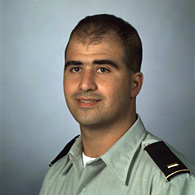Washington
10 November 2009
An attorney for a U.S. Army psychiatrist believed to have shot 13 people dead at Fort Hood, Texas says he does not believe his client would get a fair trial at the military installation where the rampage occurred. Meanwhile, more details have emerged about the suspect's alleged communication with a radical Muslim cleric, who is praising the suspect as a "hero."
 |
| Nidal Malik Hasan as a 2nd Lt. in 2000 |
"He [Hasan] is coherent. I met with him for about 30 minutes. Obviously he is aware that he is a suspect in the incident that occurred at Fort Hood," Galligan said.
Galligan spoke on the CBS Early Show. The attorney declined to answer any questions about Hasan's alleged shooting spree that left 13 people dead and dozens wounded, or what may have motivated the attack. Galligan did respond, however, when asked if his client could get a fair military trial.
"I think that would be difficult to achieve at Fort Hood, given the national media attention that has been focused on the Fort Hood community," Galligan said. "Anytime you have a high-profile case, as this one is, concerns about a fair and impartial jury will be present in any defense counsel's mind."
In the wake of the attack, Hasan's actions and possible motivations have come under intense scrutiny. After spending six years practicing psychiatry for the U.S. military in both Washington and Texas, he was about to be deployed to Afghanistan. He is believed to have had serious reservations about the upcoming tour of duty in a Muslim nation.
News reports say, in 2007, Hasan warned Army officials of "adverse events" if Muslim-American soldiers continue to be sent into battle against fellow Muslims.
More recently, U.S. intelligence officers intercepted emails between Hasan and a Muslim imam known for radical anti-American teachings. The cleric, Anwar al-Awlaki, who now lives in Yemen, once taught at a mosque in Virginia that Hasan attended and is well-known among violent Islamists, according to terrorism expert and author Evan Kohlmann.
"He [Awlaki] is a luminary who is revered by people around the world, and his name turns up again and again in homegrown terrorism cases," Kohlmann said.
Kohlmann spoke on NBC's Today program.
Awlaki's English-language Website praises Hasan as a "hero" and a "man of conscience".
But no such praise is coming from the current leadership of the Virginia mosque where Hasan once worshipped. Imam Johari Abdul-Malik publicly condemned the Fort Hood attack.
"While accepting the fact that Major Nidal Malik Hasan practiced the Islamic faith, we offer no justification for his ungodly and heinous, cowardly act of violence," Abdul-Malik said.
Some U.S. legislators are demanding answers about why Hasan's intercepted communications with the radical cleric did not prompt wider scrutiny of the psychiatrist's actions or intervention that could have prevented the attack. The White House has promised a thorough investigation of the matter, and steps to guard against a repeat of the tragedy.